
Who doesn’t enjoy these winter fruits that are juicy, sweet, and a little sour? India is home to various seasonal fruits because of its varied climate and strong agricultural heritage. The nation is blessed with an abundance of fresh fruits throughout the winter, which are tasty and nutrient-dense. These fruits offer various health benefits during the chilly months, including increased immunity and warmth. Let’s examine some of India’s most well-liked winter fruits and discover why they should be a staple of your winter diet.
Our bodies require additional nutrition during India’s winter months to remain robust and healthy. The correct fruits can help ward against seasonal illnesses like the flu, and cold weather can reduce immunity. Because winter fruits in India are rich in vitamins, minerals, and antioxidants, they naturally provide energy and help keep our bodies hydrated. Eating these seasonal fruits keeps us healthy throughout the cold months and helps us adjust to the weather shift.
Top 10 Winter Fruits in India List:
1. Oranges
Oranges, one of the most popular winter fruits, are a great source of vitamin C and are pleasant. They are abundantly accessible in several varieties throughout India, particularly in places like Uttar Pradesh and Nagpur, and are excellent for increasing immunity.Vitamin C is abundant in oranges. Oranges are a seasonal citrus fruit in the winter since they are nutrient-dense and have numerous health advantages.
Oranges health benefits throughout the winter:
- An antioxidant source that strengthens immunity
- Encourage healthy skin that is high in potassium and fiber to ward off heart disease.
- Keep your body’s fluid levels adequate.
- Due to their high nutritional content and many health benefits, oranges are a seasonal citrus fruit in the winter.
- To prevent heart disease, promote healthy skin that is rich in fiber and potassium.
- Maintain proper fluid balance in your body.
2. Custard apple:
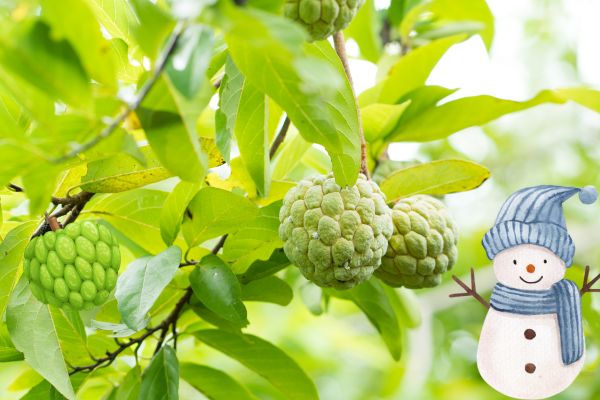
Rich in vitamin B6, this sweet and creamy fruit supports a healthy neurological system and energy metabolism. In addition, it has fiber, magnesium, and vitamin C, which support healthy muscles, digestion, and immunity.
Custard apples’ health benefits throughout the winter:
- Antioxidants included in it strengthen your defenses against the flu and winter colds. On the other hand, the high fiber content of custard apples is a dependable ally that helps you maintain healthy bowel movements and prevent constipation, giving you a sense of control over your digestive health.
- The custard apple’s high vitamin B6 content is essential for controlling serotonin and dopamine levels.
- This natural sugar is healthier than refined sugars and a great energy source.
- This helps combat wintertime mood swings, tension, and worry, providing comfort and mental well-being.
3. Winter Fruits in India – Kiwi
Kiwifruit is delicious, sweet, and slightly tart, with hairy brown skin and a luscious green inside. It is a native of China. It is grown in Himachal Pradesh, Kerala, Arunachal Pradesh, Jammu & Kashmir, and other parts of India. Savor its many health advantages by adding it to your smoothie glasses, salad bowls, or breakfast or lunch plates. You’ve likely seen a lot of recipes that call for kiwi as a key ingredient. However, the winter fruits in India contain several vitamins and minerals that will guarantee your body’s optimal operation at all times, making it one of the healthiest winter fruits in India.
- Because this fruit contains folate and other B vitamins that improve brain function.
- It may reduce the risk of cognitive decline.
- Kiwis may improve skin health.
4. Pomegranate:
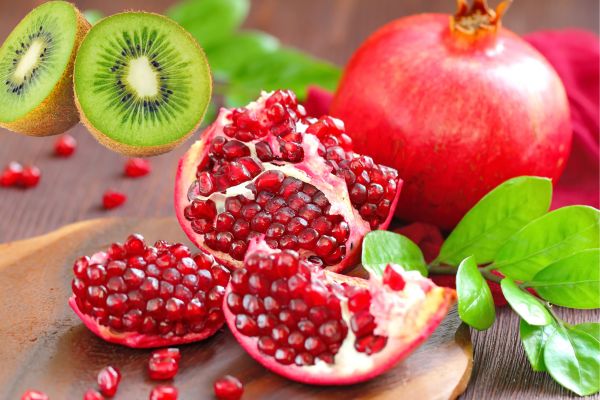
Antioxidants included in this fruit reduce inflammation, shield cells, and combat free radicals. In addition, it has fiber, potassium, and vitamin C. It also helps digestion, lowers blood sugar, and supports heart health.
The health advantages of pomegranates:
- Vitamin C strengthens your defenses against illnesses. Additionally, it possesses strong anti-inflammatory qualities.
- punicalagin antioxidants and helps lessen joint stiffness and soreness during the winter months.
- It improves blood pressure and decreases cholesterol.
- It has a high fiber content and supports gut health and a healthy digestive system.
- pomegranates help control blood sugar levels,
- Increase insulin sensitivity and avoid spikes.
4. Anjeer or Figs:
The Anjeer tree, often known as the fig, is grown for its ornamental appeal and fruits. The fruit is shaped like a pear and has green skin that can turn purple or brown. The flesh is sweet, velvety, and red and has many crunchy seeds. Both fresh and dried figs are edible.
Advantages:
- Figs are a healthy snack for controlling weight because they are low in fat and calories.
- Calcium, necessary for healthy bones and can help prevent osteoporosis, is found in anjeer.
- Iron, which is necessary for keeping blood healthy and avoiding anemia, is found in figs.
5. Apple’s:
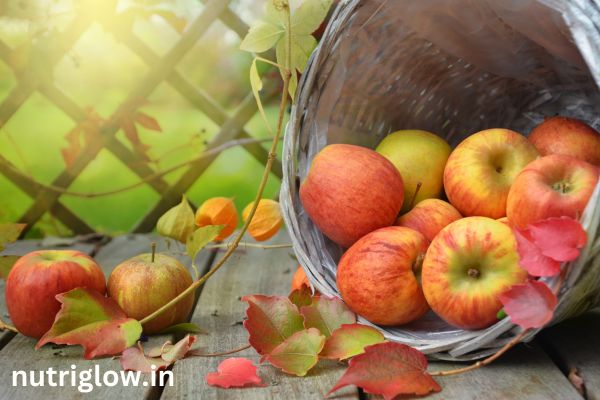
Apple, is mostly grown in the Kashmir region. Many physicians advise eating apples because of their many health benefits. Fruit from the winter season can be readily added to salads or used to create delectable dessert meals.
- Apples are a fantastic source of vitamins, minerals, and antioxidants; this adage is true.
- Apples promote digestive health.
- It reduces the incidence of cancer. Don’t miss this seasonal winter fruit at all costs.
6. Grapes:
Who doesn’t enjoy these winter fruits that are juicy, sweet, and a little sour? Grapes have a sense of royalty! This green, red, or black fruit is a nutritious wintertime snack because it is high in vitamins, minerals, and antioxidants. However, keep in mind that grapes are high in carbohydrates, so you should make sure that your daily calorie consumption doesn’t increase in any way before including them in your diet.
7. Amla or Indian Gooseberry:
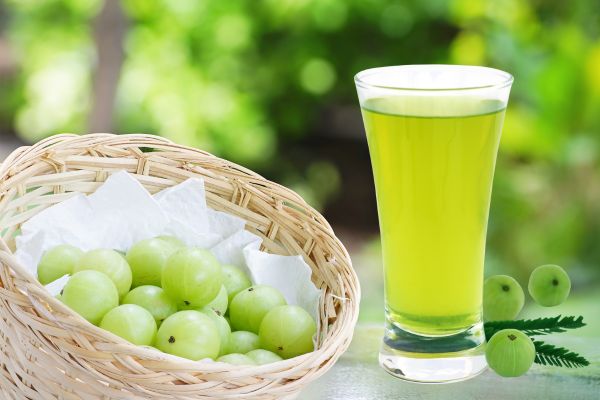
Amla, or Indian Gooseberry It is a fruit that is known to all Indians as a “superfruit.” Vitamin C is abundant in the shiny, round, light green fruit. Twenty oranges are equal to 100 grams of amla. In India, people eat it raw or cooked, and it has a sour taste. Advantages Indian gooseberries’ strong antioxidant and vitamin C content promotes healthy skin and hair. Indian gooseberry helps manage diabetes. Amla’s vitamin C increases energy levels, strengthens immunity, and guards against illnesses.
8. Pears:
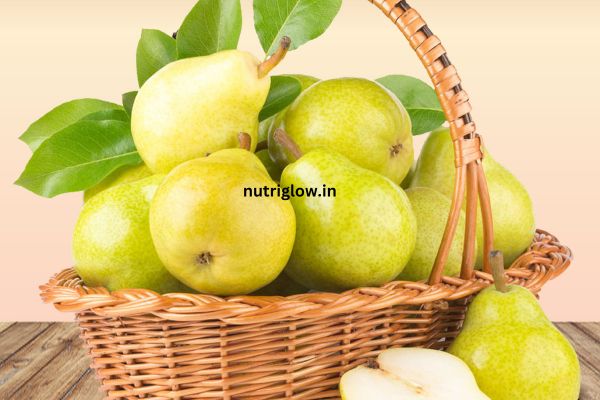
During the winter, pears are one of the fruits that will help you stay healthy and strengthen your immune system. Because they are rich in fiber, vitamins, and antioxidants, pears offer a tasty and nutritious boost to your winter diet. Their inherent sweetness makes them a low-calorie, guilt-free way to satisfy your desire. Put some pears on your plate and enjoy their sweetness this winter.
9. Indian jujube:
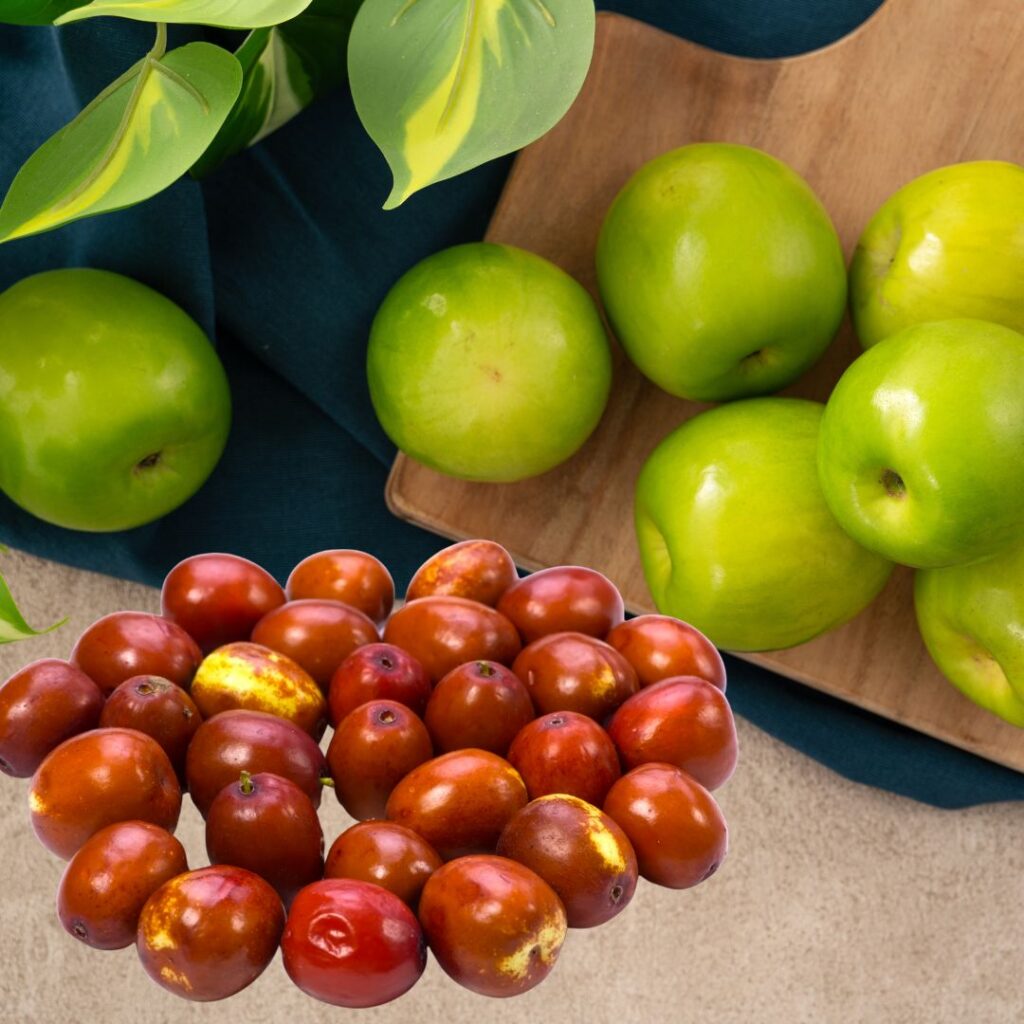
Indian jujube
Indian jujube, also known as ber, is a fruit that grows in the winter and helps with sleeplessness, constipation, and many other conditions. It is the repository for vitamins A, C, potassium, and manganese, contributing to healthy, radiant skin and hair free of dandruff.
10. Mosambi:
Mosambi is a vitamin C-rich, pulpy, citrous fruit that is a powerful antioxidant that lowers inflammation, boosts immunity, and increases infection resistance. Mosambi’s high water content aids in maintaining your levels of hydration.
Conclusion:
In addition to being delicious, winter fruits in India are packed with health advantages. They support better digestion, immunity, and general health throughout the winter months thanks to their abundance of vitamins, antioxidants, and fiber. Whether it’s the refreshing sweetness of oranges, the fiber-rich guavas, or the acidic joy of pomegranates, each fruit has a unique contribution to make. You can sustain your health, hydration, and vitality levels all winter long by include these seasonal fruits in your diet. To make the most of the season, savor winter fruits fresh, in juices, or in a variety of dish preparations.

Pingback: "Discover the Benefits of Drinking Sugarcane Juice
Pingback: Say Good bye to Sick Days: Best Foods To Boost Your Immunity